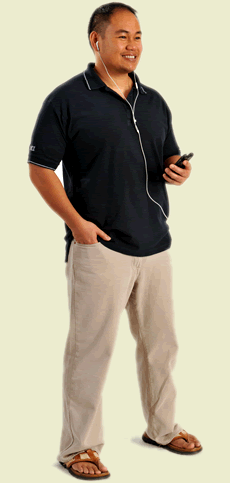AWR News
News Archives
Serving a “New Continent”
June 14, 2010 13:28
“Where can I hear your programs?”
 This is a question that AWR staff and volunteers frequently hear as we talk with church members at campmeetings and other events in places such as North America, Australia, and portions of Western Europe. We’re delighted when people show such interest in experiencing our ministry, and yet for many years we have had to regretfully tell them, “Well, since AWR’s focus is mission radio, we concentrate on broadcasting to the hardest-to-reach places of the world. So unless you are able to pick up a stray shortwave signal, you likely will not be able to hear our programs for yourself.”
This is a question that AWR staff and volunteers frequently hear as we talk with church members at campmeetings and other events in places such as North America, Australia, and portions of Western Europe. We’re delighted when people show such interest in experiencing our ministry, and yet for many years we have had to regretfully tell them, “Well, since AWR’s focus is mission radio, we concentrate on broadcasting to the hardest-to-reach places of the world. So unless you are able to pick up a stray shortwave signal, you likely will not be able to hear our programs for yourself.”
Church members have been gracious in their understanding of this explanation, and their firm support has enabled AWR to continue sharing the message of hope for nearly 40 years with listeners in countries such as Pakistan, Vietnam, Somalia, and more. “It says a lot about Adventists’ commitment to mission when they send generous gifts to AWR year after year, without being able to see or hear our ministry for themselves,” says AWR president Ben Schoun.
Now, however, AWR’s wealth of programs are available to anyone with an Internet connection, anywhere in the world. The scope of AWR’s ministry expanded enormously this summer, with the launch of our new website, which features a comprehensive podcasting service and listen-on-demand function. Now people can listen to all of AWR’s programs – in all 80 languages – at any time, without having to tune in to a shortwave program or local radio station at a particular time and place.
A New Destination
“When we began planning for our new website, we decided that we wanted it to be a place where people could not just read about our organization, but where they could actually listen to our programs from any location,” says Marvin King, AWR web manager. “Since our producers from around the world were already sending their programs to us for distribution through shortwave and local radio broadcasts, it made sense to extend the value of those programs by repurposing them for ongoing use through the Internet.”
AWR actually began testing the response to online programs several years ago, by manually converting selected radio programs to podcasts. The first language to be offered as a podcast was French, and after the first year – with no advertising – the number of subscribers had reached nearly 50,000. Today, the French podcast on health subjects has more than 870,000 daily downloads. Another early podcast was Amharic, one of the languages of Ethiopia, and statistics showed that it was attracting subscribers from countries as diverse as India, New Zealand, and the Netherlands.
Reaching New Audiences
“When people are living far from their homelands, they are especially anxious to hear messages in their mother tongues,” Schoun says. Indeed, AWR received an e-mail from an Ethiopian man living in Texas, who described how much it meant to him and his family to hear a program in their first language, Amharic. This digital world of listeners is a whole new audience for AWR – what AWR global resource engineer Daryl Gungadoo calls “the new continent.”
Manually preparing programs for use as podcasts is very labor intensive, however, so AWR began looking for an organization-wide solution through which the process could be automated. Late last year, AWR moved forward in faith and made a major investment in a media asset management system. The hardware and software system that was selected is called Mediator, a particularly appropriate name for its use at AWR as a communication vehicle for messages of God’s love and salvation.
“Mediator moves AWR to a new generation for the distribution of gospel programming and other technical processes,” Schoun says. “This represents a substantial financial investment for AWR, but we feel that it is clearly worth it. Continuing to adopt new technologies makes it possible for us to reach ever-increasing numbers of people with the gospel. We will have a better chance of connecting with young people and other tech-savvy persons in the developed world who do not listen to radio as much anymore.”
 A New Experience, Greater Exposure
A New Experience, Greater Exposure
People who are familiar with AWR’s previous website will immediately notice how the new site offers a very different experience. It is designed to serve visitors from around the world, beginning with something called “geolocation.” This function identifies the geographic location of a visitor’s Internet connection, and immediately takes them to a section of the site that is translated into the most likely language for their area. The visitor is also offered a list of suggested languages to which they might want to listen.
For example, an Internet user in China who comes to awr.org would arrive at a webpage written in Mandarin, and could then listen to programs in Asian languages such as Mongolian, Hmong, Uyghur, and more. (If the visitor is not familiar with Mandarin, they could choose to display the page in another language.)
The advantage of podcasting, over other forms of broadcasting, is that it is an on-demand experience. Subscribers can access the content they want, when they want it, and they will automatically receive new programs as soon as the podcast feed is updated. On the other hand, new tools that have been developed in conjunction with AWR’s new website will assist listeners who tune in to traditional broadcasts; a prime example is the new AWR iPhone application, which features our shortwave broadcast schedule.
Another beneficial feature of Mediator – coming in the next phase of development – will be the ability to search for keywords in all of the programs, in the respective languages, through the most popular podcatchers. For example, someone who is interested in Russian programs that address smoking, family life, or salvation will be able to search for those topics. In addition, AWR is working on creating a mobile version of our website, which will allow people to have access to our content on their mobile devices.
New Witnessing Resource
AWR’s new podcasts not only enhance AWR’s own website, but will also maximize AWR’s web presence through other outlets. “The fact that these programs are listed in popular podcasting services, such as iTunes, gives us much greater exposure to the public than being limited to those who are able to find our website,” King says. “Furthermore, the podcasts can be syndicated through other websites, e-mail distribution lists, blogs, and social networking sites, so people who have never visited our site will be exposed to our programs.”
Another way to share the news of AWR’s programs is through traditional word-of-mouth communication. “We’re excited not only that Adventists in North America and elsewhere will be able to hear our programs,” Schoun says, “but that they will also be able to share them with their friends and neighbors … in their own language. Few of us are able to talk about God and His love in Vietnamese or Fulfulde or Azeri, but we can invite our neighbors to listen to a whole collection of AWR programs in these languages. We expect that our podcasts will quickly become a valuable tool for churches and members who are seeking to minister to particular communities.”
To assist members with the invitation process, AWR is developing a collection of downloadable “neighbor invitations” in every podcasting language, which can be printed and shared with friends and neighbors (go to awr.org/invite).
“AWR’s ministry has grown in ways that the organization’s leaders could hardly have imagined when they aired AWR’s first shortwave broadcast in 1971,” Schoun says. “Now, rather than broadcasting on the radio to one targeted area, AWR is able to reach the entire world all at once, which is incredibly exciting.”
Ways you can support
Adventist World Radio:











